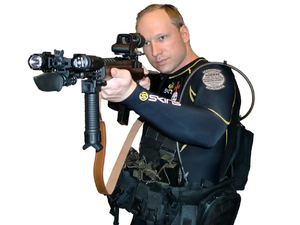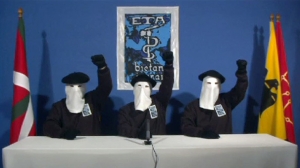The headlines from the events in Norway on Friday July 22 were shocking:
"Norway Police say 85 killed in island youth camp attack" and "Explosion, Shooting Rock Norway".
They reflected the actions of Anders Behring Breivik, a self-proclaimed hero who was "saving Norway and Western Europe" from "cultural Marxism and Muslim takeover." Sadly, this is nothing new.
One can imagine an eerie similarity with headlines from Sarajevo on June 28, 1914: "Heir to Austria's throne is slain with his wife by a Bosnian youth to avenge seizure of his country."
Breivik, voiced his reasons behind his radicalism in a 1500 page manifesto he posted on the internet the day of the attacks,
"Multiculturalism, as you might know, is the root cause of the ongoing Islamisation of Europe which has resulted in the ongoing Islamic colonisation of Europe through demographic warfare (facilitated by our own leaders)."
To Breivik, liberalism, tolerance, and political correctness have created a multicultural environment in Europe where, "all cultures and religions are 'equal' ". In this environment, Western governments "launched a great campaign of deception against their own people with the goal of creating a falsified version of the Islamic and European civilisation, in order to make them equal."
Urging other Christian Europeans into action he declares, "Time is of the essence. We have only a few decades to consolidate a sufficient level of resistance before our major cities are completely demographically overwhelmed by Muslims" (see Philosophy of Oslo Killer: Excerpts from Anders Breivik's Manifesto 25 July 2011).
Sound familiar? Adolf Hitler used similar imagery in Mein Kampf describing Jews as "parasites" who were "never in the possession of a culture of their own" therefore they "take over foreign culture, only imitating, or rather destroying it" (417).
All three of these men, the Serbian assassin, Hitler, and Berivik saw their world as under threat from 'others' and chose radical paths to protect the purity of their homeland from 'invasion'.
This is not trying to paint all Europeans as radical and extremists. What is true is that the forces that influenced the Serbian assassin in 1914 and Adolph Hitler in 1925 are similar to those that shaped the mind of Breivik in 2011: nationalism and the perceived threat to this idea.
What is this notion of nationalism that would make people take extreme measures to protect it?
Donald Kagan of Yale defines nationalism as, "The belief that one is part of a nation, defined as a community with its own language, traditions, customs, and history that distinquish it from other nations and make it a primary focus of a person's loyalty and identity" (The Western Heritage, G7).
Given this definition, proponents of nationalism's exclusionary ideology attempt to define who belongs to the 'nation'. Those that don't 'belong' are labeled as outsiders and a threat.
The shifting boundaries of European nations since WWI reflect this notion of nationalism.
After WWI, the mighty empires of Russia, Germany, Austria-Hungary, and the Ottomans fragmented into many smaller states that attempted to group together several different cultures and ethnic groups. Czechoslovakia for example contained Czechs, Slovaks, Germans, Poles and Magyars. Yugoslavia contained Serbs, Slavs, Croats, and Slovenes. This experiment in multicultualism did not last however; Czechoslovakia split into the Czech Republic and Slovakia in 1993. The Yugoslavia held together by Marshal Tito no longer exists, and two decades after the Yugoslav war in the 1990s, tensions are still running high today (see Kosovo PM Backs Deadly Move into Serb-run North 26 July 2011). Europe is fragmenting along ethnic, cultural, and nationalistic lines.
Are there some exceptions to this trend of fragmentation? While the Basque separatists in northern Spain have given up armed confrontation, they have not given up their goal for their own homeland (see Basque Separatists' Cease-Fire Declaration Not Sufficient Says Spain 10 January 2011).
Likewise, Sinn Fein's call to cooperate with the police in Northern Ireland is marred by recent reports of grenade attacks (see IRA Dissidents Toss Dud Grenade at Northern Ireland Police 10 May 2011).
The most recent violence in Norway reflects the growing concern that many Europeans feel about Muslims immigrating into Europe, living in their communities, and somehow eroding their own culture.
Remember the recent law enacted in France over the burqa and niqab? (see France's Burqa Ban Adds to Anti-Muslim Climate 11 April 2011) Or the flap over the depiction of Muhammad as a dog in Scandinavian newspapers? (see Cartoon of Prophet Muhammad Dogs Swedish Artist 1 Feb 2011) These are not isolated incidents but a reaction among many in Europe as the debate swings between liberal acceptance and toleration of Muslims to intolerance and extremism.
Adding to the narrative of the mistrust of Muslims, the events of 9-11 loom large in the minds of many as George Bush called it an attack on all democratic nations.
Kagan called nationalism, 'the single most powerful European political ideology of the nineteenth and early twentieth centuries". Clearly, the notion of nationalism has extended into the twenty-first century and the liberal, tolerant, democratic Europe still has to face its darker side.
Bret Thayer currently teaches World and European History with 15 years of classroom experience and is passionate about helping other teachers and students reach their highest potential.
References:
Beardsley, Eleanor. "France's Burqa Ban Adds to Anti-Muslim Climate." NPR Morning Addition 11 April 2011. <http://www.npr.org/2011/04/11/135305409/frances-burqa-ban-adds-to-anti-muslim-climate>
"Explosion, Shooting Rock Norway." NPR: All Things Considered 22 July 2011. <http://www.npr.org/2011/07/22/138619930/explosion-shooting-rock-norway>
Hitler, Adolph. Mein Kampf. New York: Houghton Mifflin Co., 1939.
"IRA Dissidents Toss Dud Grenade at N. Ireland Police." The Associated Press 10 May 2011. <http://www.npr.org/templates/story/story.php?storyId=135712711>
Kagan, Donald, Steven Ozment, and Frank M. Turner. The Western Heritage. Upper Saddle River, NJ: Prentice Hall, 2004.
"Kosovo PM Backs Deadly Move Into Serb-Run North." The Associated Press 26 July 2011. <http://www.npr.org/templates/story/story.php?storyId=138714573>
"Norway Police Say 85 Killed in Island Youth Camp Attack." BBC News 23 July 2011. <http://www.bbc.co.uk/news/world-europe-14259356>
Peralta, Eyder. "Basque Separatists' Cease-Fire Declaration Not Sufficient, Says Spain." The Two-Way: NPR News Blog 10 Jan. 2011 <http://www.npr.org/blogs/thetwo- way/2011/01/10/132806215/etas-cease-fire-declaration-not-sufficient-says-spanish-government>
"Philosophy of Oslo Killer: Excerpts from Anders Breivik's Manifesto." International Business Times 25 July 2011. <http://www.ibtimes.com/articles/186169/20110725/philosophy-of-oslo-killer-excerpts-from-anders-breivik-s-2080-european-declaration-of-independence-o.htm>
Reeves, Philip. "Cartoon of Prophet Dogs Swedish Artist." NPR: Morning Addition 1 Feb. 2011 <http://www.npr.org/2011/02/01/133395328/Prophet-Mohammed-Cartoon-Dogs-Swedish-Artist-Lars-Vilks>



Such nationalism seems especially at odds with unification efforts such as the EU. Yet we see more examples in addition to the ones you cite, such as Denmark putting up border controls in defiance of the EU. And I wonder why nationalism seems to come from the right wing, regardless of the country?
It’s not unique to Europe though, is it? And – what can we do about it?
The EU acts like more of an economic bloc and not a political union; no European nation is losing their political sovereignty but they must come together and agree on economic policies and abide by those policies.
And yet, as you mention, there are growing cracks in this bloc due to bailouts of Greece, Ireland, and Portugal.
Nationalism itself can be either a left or a right wing ideology; it depends on what it’s used for. Those who see nationalism on the far right would use it to exclude others and make their nation a more ‘exclusive club’.
Others may simply view nationalism as a way to compare metal counts in the Olympics or who won the World Cup. It’s the exclusionary, intolerant kind of nationalism that can be dangerous.
What can be done about this? Teach tolerance.